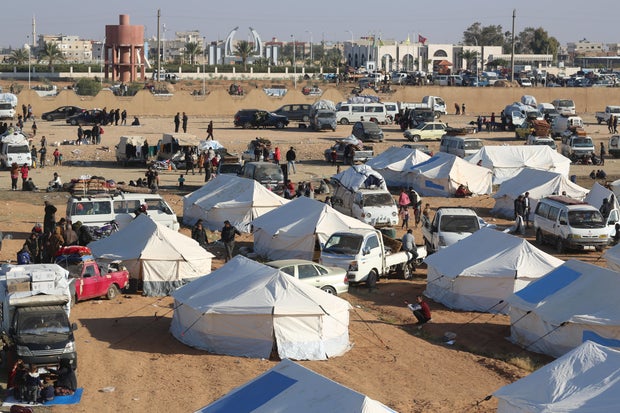Syrian rebel forces were closing in on the country's third-largest city of Homs on Friday, a human rights group that monitors the war said, raising expectations that the country's capital, Damascus, could be recaptured. off from coastal areas that are a stronghold of President Bashar al-Assad. .
The UK-based Syrian Observatory for Human Rights, which has relied on a network of sources on the ground to closely monitor the war since it began in 2011, said rebel forces had gone advanced directly about three miles from the city, and that regime troops had withdrawn from several nearby towns and villages as a result of the advance.
SOHR said Assad's forces had carried out airstrikes on water infrastructure in a nearby city and on a highway, but no casualties were reported.
What is happening with the war in Syria?
Thousands of people were fleeing the area amid the escalation of the civil war, which had raged without significant progress on either side for years, until the the rebels mounted an offensive about two weeks ago
The rebels took complete control of another city, Hama, and about a week later began a sweeping offensive across the north of the country. The first major prize in their offensive was to gain control of Aleppo a week ago, which was the second most populous city in Syria for a long time.
Their sudden advance has surprised many observers of the long-simmering conflict, and SOHR says more than 820 people have been killed since it began, taking its -in more than 100 civilians.
Syrian rebels say the goal “remains the destruction” of Assad
The war in Syria began in 2011 when an anti-democracy uprising demanding an end to Assad's long rule quickly escalated into a brutal civil war. Since then, the conflict has killed more than 500,000 people and displaced an estimated 12 million from their homes.
The war appeared to have stalled after the Assad government regained control of many towns with the help of Russia and Iran, as well as the powerful Iranian proxy group Hezbollah in Lebanon. Some areas in the north and east of the country have remained under the control of Kurdish-led rebel groups, supported by the US. The current offensive, however, has been largely led by the militant group Hayat Tahrir al-Shams (HTS), which has sought to publicly distance itself from its jihadist roots. as a regional branch of al Qaeda.
With another current conflict involving Assad's backers Iran, Russia and Hezbollah, it is believed that the rebel forces saw an opportunity to renew their fight against his army.
The head of HTS told CNN in a recent interview that the aim of the attack was to remove Assad from power.
“When we talk about goals, the goal of the revolution is to overthrow this regime,” Abu Mohammad al-Jawlani told CNN. “The seeds of the regime's defeat have always been inside it. … the Iranians tried to revive the regime, buying it time, and later the Russians tried to support it. But the truth remains: this regime is dead.”
The Syrian rebel offensive is exacerbating the humanitarian crisis
Tens of thousands of civilians have fled the fighting recently, many of them heading for Raqqa province, which is held by the US-backed Syrian Democratic Forces (SDF).
CBS News
Despite an agreement to allow safe passage for those fleeing Aleppo province, SDF sources told CBS News that more than 120 vehicles carrying hundreds of civilians were attacked by various Syrian Islamic groups on the journey. Local authorities say the humanitarian situation for those arriving in safe areas is dire.
About 136 schools in Raqqa and 63 schools in Tabqqa city have been turned into makeshift shelters for IDPs. Raqqa Stadium, once used as a prison by ISIS militants when they controlled the land, has been turned into a camp to shelter civilians displaced from the cold weather.
“The situation is dire,” Zhwan Mullah, a member of the local emergency response team, told CBS News. “The number of IDPs is much more than we can help. Support from the UN and NGOs so far has been very little.”
Saeed Muhammad Hassan, 53, fled to Raqqa from near Aleppo. Along the way, he was separated from his wife, Sabah. Hassan, like a growing number of civilians who have been separated from loved ones while evacuating from war-torn areas, took to local radio stations to issue a plea for to reunite with Sabah.
“Many people are coming to us through different channels, looking for family members who are lost and who have gone quietly on the road to safety,” said Sirwan Haji Birko, head of ARTA FM radio, to CBS News. “We try to help as much as we can to find those who are missing, on the radio and on our social media platforms.”






